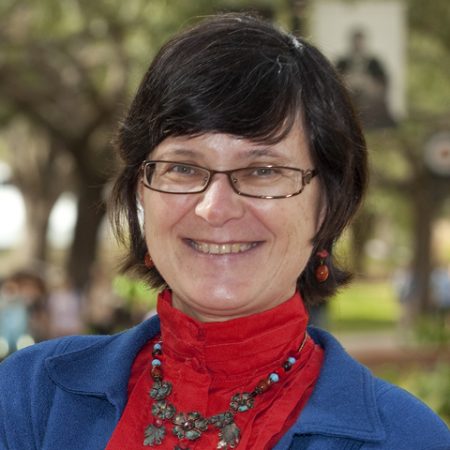
Few people in academia have the honor of being named a Fulbright scholar. However, a Florida State University faculty member has now doubled that honor, receiving her second faculty Fulbright award in 14 years.
Suzanne Sinke, an associate professor in Florida State’s Department of History, will travel to Salzburg, Austria, later this month to teach and conduct research after earning her second faculty Fulbright award. While at the University of Salzburg, she will teach two U.S. history classes, one on gender and one on international migration, as a visiting faculty member in the cultural and social sciences department through July 2013.
“FSU is very fortunate to have Suzanne Sinke represent the university in Salzburg,” said Margaret Wright-Cleveland, director of the university’s Office of Faculty Recognition. “Her ability to work effectively across cultures is so noteworthy that she has garnered two Fulbright awards, a stellar accomplishment.”
Indeed, traveling to Europe as a Fulbright Scholar is becoming old hat for Sinke. In 1999, she traveled to Finland to teach for a year after receiving her first Fulbright.
“The last Fulbright was the best year of my life,” she said. “It was so wonderful to get to know people, to work with students, to understand what the education system was like, to get to know something of the culture and to share some of my culture as well.”
Sinke, who joined the FSU faculty in 2002, said her main area of research comes from a curiosity to understand how far people are willing to go when it comes to the big “I do.”
“It’s relating marriage and migration, so it can either be ways in which people move to marry, or move to avoid being married, or perhaps because of migration they’re not allowed to marry or they don’t have opportunities.”
Sinke has written a book, co-authored three more books, and published several journal articles on topics including migration, gender issues and ethnic history. For the past four years, she has also been a member of the College Board, helping to establish the Advanced Placement history curriculum for high school students throughout the United States.
“To be awarded a second Fulbright is a wonderful recognition of Professor Sinke’s superb work as a research scholar and teacher,” said Jonathan Grant, chairman of the Department of History. “We are tremendously proud of her accomplishment.”
As the daughter of a history teacher, Sinke said she always knew what she wanted to do with her life.
“I grew up looking at history and going to historical sites and seeing how much the past still has an impact on us today and how important it is for people to understand that,” she said. “So I felt it was important to try to put find more stories from history that haven’t been told.”
Sinke joins a growing list of faculty Fulbright recipients at Florida State. More than 40 have served as Fulbright scholars since 1990.
“It’s such a fantastic opportunity,” she said. “It is so wonderful to have a chance to really work with people on an in-depth basis and to work with other students, to work with people around the world.”
While in Austria, Sinke plans to make sure there’s a written history of her visit by maintaining a blog. She will also stay busy crafting her next big project on transnational migration and marriage, as well as giving lectures and even taking informal hiking excursions throughout the country.
“I welcome the opportunity to work with students in Salzburg, to learn more about the Austrian culture and to bring a little bit of FSU and my experience to another group of students and scholars,” she said.
Sponsored by the U.S. Department of State’s Bureau of Educational and Cultural Affairs, the Fulbright Scholar Program is an international educational exchange program designed to increase the mutual understanding between citizens of the United Sates and those of more than 155 participating countries. Roughly 1,600 U.S. students, 4,000 foreign students, 1,200 U.S. scholars and900 visiting scholars receive awards each year, in addition to several hundred teachers and professionals.




